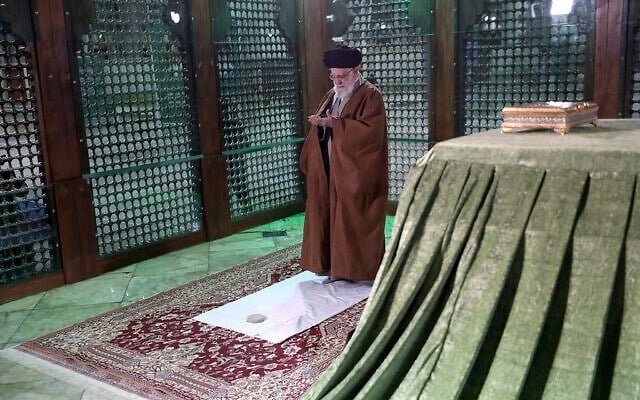Iran’s supreme leader said Friday that if the United States “threatens” Iran’s security, “we will threaten them in return,” adding that negotiations with America “are not intelligent, wise or honorable” after US President Donald Trump floated nuclear talks with Tehran.
“The Americans sit, redrawing the map of the world — but only on paper, as it has no basis in reality,” Ayatollah Ali Khamenei said at an Iranian Air Force event in Tehran. “They make statements about us, express opinions and issue threats. If they threaten us, we will threaten them in return. If they act on their threats, we will act on ours. If they violate the security of our nation, we will, without a doubt, respond in kind.”
Khamenei also suggested that “there should be no negotiations with such a government,” but stopped short of issuing a direct order not to engage with Washington.
Khamenei’s remarks upend months of signals from Tehran to the United States that it wants to negotiate over its rapidly advancing nuclear program in exchange for the lifting of crushing economic sanctions worth billions of dollars.
What happens next remains unclear, particularly as reformist President Masoud Pezeshkian campaigned on and promised as recently as Thursday to enter into a dialogue with the West.
Khamenei’s remarks to air force officers in Tehran appeared to contradict his own earlier remarks in August that opened the door to talks. However, the 85-year-old Khamenei has always carefully threaded his remarks about negotiating with the West. That includes balancing the demands of reformists within the country who want the talks with those of hardline elements within Iran’s theocracy, including the paramilitary Revolutionary Guard.
Khamenei noted that Trump in his previous term unilaterally withdrew from an earlier nuclear deal under which Iran drastically limited its enrichment of uranium and overall stockpile of the material, in exchange for crushing sanctions being removed.
“The Americans did not uphold their end of the deal,” Khamenei claimed. “The very person who is in office today tore up the agreement. He said he would, and he did.”
He added: “This is an experience we must learn from. We negotiated, we gave concessions, we compromised — but we did not achieve the results we aimed for. And despite all its flaws, the other side ultimately violated and destroyed the agreement.”
It’s not clear what sparked Khamenei’s remarks. However, they come after Trump suggested he wanted to deal with Tehran, even while signing an executive order to reimpose his “maximum pressure” approach to Iran on Tuesday.
“I’m going to sign it, but hopefully we’re not going to have to use it very much,” Trump said from the Oval Office. “We will see whether or not we can arrange or work out a deal with Iran.”
“We don’t want to be tough on Iran. We don’t want to be tough on anybody,” Trump added. “But they just can’t have a nuclear bomb.”
Trump followed with another online message on Wednesday, saying: “Reports that the United States, working in conjunction with Israel, is going to blow Iran into smithereens, ARE GREATLY EXAGGERATED.”
“I would much prefer a Verified Nuclear Peace Agreement, which will let Iran peacefully grow and prosper,” he wrote on Truth Social. “We should start working on it immediately, and have a big Middle East Celebration when it is signed and completed.”
Khamenei, like other Iranian leaders, uses elliptical comments to indirectly govern policy while not boxing himself into any one decision. As supreme leader, he’s also created a vast bureaucracy that competes with itself for influence, including with its civilian leadership under Pezeshkian.
As recently as Thursday, Pezeshkian suggested Iran could open itself up to even more inspections from the United Nations’ nuclear watchdog, the International Atomic Energy Agency.
During his previous term in office in 2018, Trump pulled the United States out of Tehran’s 2015 nuclear pact with world powers and reimposed sanctions that have crippled the country’s economy.
The harsh measures prompted Tehran to violate the pact’s nuclear limitations.
A senior Iranian official told Reuters on Wednesday that Iran is ready to give the United States a chance to resolve disputes.
